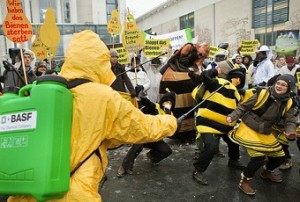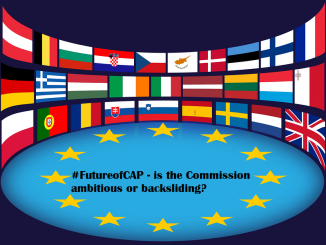The European Commission’s Standing Committee on the Food Chain and Animal Health failed to reach qualified majority vote on banning three specific neonicotinoids. This is despite the scientific evidence, ESFA recommendation, and the fact that the ban was only intended to be a partial and temporary ban. The restriction was only to be in place for flowering crops specifically attractive to bees, and only for two years as a trial priod.

This will come as a major disappointment to EU citizens, 2.5 million of whom signed a petition on the matter. 71% of respondents in a UK opinion poll stated they favoured a ban. Iain Keith, from Avaaz, the organisation which amassed the signatures, said: “Today’s vote flies in the face of science and public opinion and maintains the disastrous chemical armageddon (sic) on bees, which are critical for the future of our food.”
Neonicotinoids travel to all parts of the plant and also “get into the pollen and nectar, then pollinators, such as bumblebees, consume them,” ecologist Prof David Goulson from the University of Stirling told the BBC’s Farming Today programme.
The three insecticides in question are used in tillage, horticulture, forestry and for amenity gardening in dozens of products across Europe. Widely available products such as Redigo Deter, Bug Free Extra, Intercept Couraze, Gaucho, Imidasect 5GR, Merit Turf, Provado Vine and Weevil Killer contain these insecticides. Syngenta and Bayer manufacture many of the products containing the insecticides in question – Clothianidin, Imidacloprid and Thiamethoxam.
The vote follows an intensive round of corporate lobbying, including an industry funded report claiming massive economic consequences from such a ban. It estimated that over 5 years the cost to the industry could amount to €17 billion and put 50,000 jobs at risk. (for more on corporate lobbying see this recent post on ARC2020)
Syngenta chief operating officer, John Atkin, is “pleased Member States did not support the EC’s shamefully political proposal.” He added that “restricting the use of this vital crop protection technology will do nothing to help improve bee health.”
In the end, 13 countries voted for the ban, five abstained while just three voted against. Individual countries in the EU such as France and Italy already restrict the use of neonicotinoids.
A ban seemed likely when in January, the EFSA issued a report on three neonicotinoids. Clothianidin, Imidacloprid and Thiamethoxam pose, the EFSA claim, “high acute risk” to honey bees.
For links to the specific EFSA reports on each of the three insecticides see here .
Some light at the end of the tunnel for campaigners: “Member states now have two months to find a compromise, otherwise the European Commission will be free to unilaterally ban the pesticides” Reuters reported. This can only happen if the Commission takes the case to appeal however, as it does with GM crops.





The Humboldt study is nowt but humbug.. (that is where this figure of 17 billion euro over 5 years was conjured up from – an industry-funded, non-peer reviewed, economic desk study – it is not a scientific paper, just the usual psuedo-science smoke-and-mirrors tricks from the agro-chemical lobby. They are doing what the tobacco industry and the petrochemical industry tried to do before them in decades past… ).
Pollination “services” by bees and other pollinators are worth more than 5 times more than that , being estimated at 15-22 billion euro per YEAR !
So the choice is clear. In these next 2 critical months, will YOUR government be towing the agro-chemical industry line, or will it act in the best interest of the bees and ALL of us?! Tell your ministers – “Give bees a chance!”